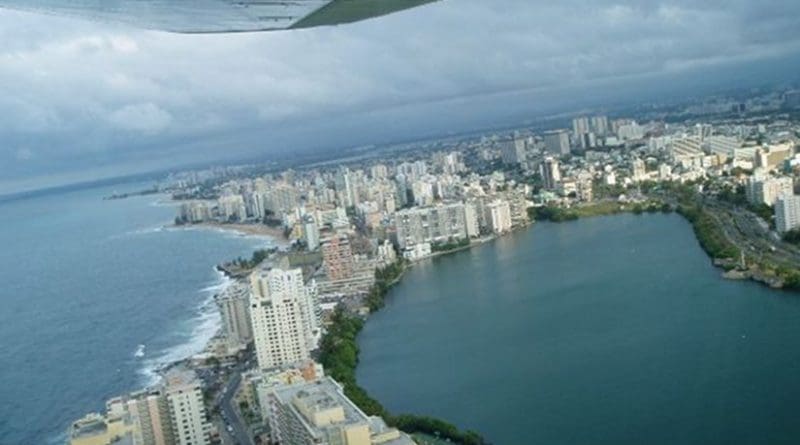Puerto Rico Governor Says Debt Owed To Creditors Is ‘Unpayable’
Puerto Rico lacks the means to pay its debt that has risen to US$73 million and represents 70 percent of its gross domestic product. On Aug. 1, the island should have paid $58 million, but only paid the interest which grew to $628,000, therefore falling into arrears.
Governor Alejandro García Padilla admitted in a message to the nation on July 29 that “the public debt, considering the level of current economic activity, is unpayable. But, also, the size of this debt impedes us from getting out of the cycle of recession and contraction.”
García Padilla quoted a report prepared by Anne O. Kreuger, Ranjit Teja and Andrew Wolfe, former officials of the International Monetary Fund (IMF) and the World Bank (WB), in which they recommend a series of structural reforms to deal with a “decade of stagnation, emigration and debt.”
Since the beginning of its four-year term in 2013, García Padilla’s administration applied a series of measures to deal with the crisis which included an increase of the sales tax from 7 percent to 11.5 percent, pension reform and reducing public expenditures, but these have not been sufficient. The above report recommends structural reforms such as a gradual reduction of labor costs to promote employment, lowering the high costs of electricity and transportation, and elimination of the obstacles for those who wish to do business, among others. The report also suggested fiscal and institutional reforms.
However, García Padilla pointed out that he does not agree with all the report’s recommendations. “I will not support, for example, seeing education as a cost rather than an investment, nor will I support reductions in the minimum wage for workers, among other reservations. Also, I will defend jobs as the main goal in this process,” he said.
The Governor proposed a plan to restructure the economy whose “first step, the most important, will be to re-establish economic growth. Although more fiscal adjustments will be necessary, it is clear that without strong growth of production in Puerto Rico, we will never get out of this vicious cycle of contraction, emigration, austerity and taxes. The economic agenda that we have introduced since the beginning of my administration has had some success in improving jobs, manufacturing, agriculture, aerospace industry, health services, and research and development; and we see results reflected in the reduction of unemployment, but, again, we need to do more, we need to do much more.”
No light at the end of the tunnel
But the solution is not around the corner. The unemployment rate grew to 12.4 percent and migration to the United States has accelerated. Puerto Rico actually has 3.7 million inhabitants; only in 2014 around 140,000 residents abandoned the island.
Also, Puerto Rico, as a US commonwealth, does not receive the same benefits as other states in the United States, which upon declaring themselves bankrupt receive legal protection from their creditors and are permitted to restructure their debts. The island cannot make unilateral decisions, can only use the US Merchant Marine to transport products to and from the island, and cannot establish bilateral relations with other countries.
García Padilla has stated that his government cannot continue requesting credit to deal with its budget deficit while demanding that the Puerto Rican people assume the major burden with increased taxes and pension reductions.
Investment funds that took advantage of fiscal privileges to acquire bonds and that control one-third of the Puerto Rican debt have proposed the firing of teachers, cuts in health services and a reduction of subsidies to higher education.
In September García Padilla must submit a plan to restructure the debt to the US Congress that should approve it. Although the White House has announced that it does not foresee a financial rescue of the Puerto Rican government, President Barak Obama formed a commission to coordinate assistance to the island without violating federal laws.
“We will not permit the heavy burden of the inherited debt force us to kneel,” proclaimed García Padilla. “We cannot allow anyone to force us to choose between paying police, teachers and nurses, or pay the debt. Another way is possible. We need to act now, together. We have to share responsibility and sacrifice in order to share the benefits of a growing Puerto Rican economy.”
The Ecumenical and Inter-Religious Coalition of Puerto Rico released a statement published on Aug. 31 expressing its concern for the “the debt, the non-payment, the proposals to reduce salaries, possible layoffs of workers, reduction of workers benefits and cuts in health services. Austerity measures cannot be allowed to adversely affect the poorest and neediest in Puerto Rico.”
“The [US] Federal Reserve has the capacity to restructure our debt, mitigate the austerity policies and insure debt relief without conditions which are harmful and onerous,” added the statement.

